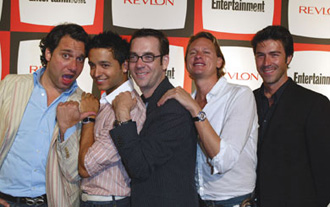 Reality bites, so why do we watch?
Reality bites, so why do we watch?
Q: Question for playwright and drama professor Wendy MacLeod '81: Reality TV shows, which appeared at first to be a passing fad, are proliferating nearly to the point of ubiquity. Is "reality" here to stay? What draws viewers to watch--and participants to appear----in these shows? Does our appetite for reality TV tell us anything about our culture at this moment?
A: It's astonishing to me how many Americans are willing to whore themselves on national television for ... whatever: a rich husband, a chance to work with Donald Trump, a recording contract. Most of them don't even walk away with The Big Prize. The prize for them is just being on television, like Narcissus gazing into the high-def pool. While playwrights and screenwriters everywhere are struggling to create characters that aren't stereotypical, real people are leaping at the opportunity to present themselves as stereotypes. Perhaps it's a relief to be reduced to a few bold strokes--the vixen, the good girl, or the hard-working Brooklyn boy. While these benign stereotypes are occasionally contradicted by the contestants' police records, there seems to be no danger of running out of willing contestants.
There is also no danger of reality on reality television. They may be hiring fewer writers, but the editors are geniuses. Their job is to make so-called ordinary people look vaguely interesting. And our job is to feel superior to these morons.
I was briefly infatuated with Queer Eye for the Straight Guy because it reinforced my shallowly held belief that what you wear matters. But where the show and I parted company was on the girlfriends. These straight guys were using product, waxing their buttocks, and throwing out mountains of pizza boxes all to convince their girlfriends to marry them. Then the girlfriend would walk in and ... oh my God. This was their big prize? Who were these women? And where did they get those voices? Had they all been sucking helium on Staten Island? One of them was wearing boots up to her thighs. I hadn't seen boots like that since I transferred buses in the meatpacking district.
If, as Warhol said, shopping malls are the new museums, then reality television shows are the new catalogues, as evidenced by the bold product placements on Queer Eye. If you shop at Diesel, Design Within Reach, or even Pottery Barn, you will find love, look ten pounds slimmer, and feel good about yourself. We are reminded of why television exists: to make us buy stuff.
Why do we watch reality television? Nobody knows. Nobody, not even television executives, can predict what we'll watch. They might as well be picking names out of a hat. I remember walking into an office at NBC a few years ago, to find a development exec shaking his head in disbelief because he'd just bought an idea about a gladiator in ancient Rome. This sounded really stupid, but have you seen Rome on HBO? It's awesome. You know what it's about? A gladiator in ancient Rome! The poor guy had bought the right idea, but the wrong show, at the wrong time. We weren't ready for gladiators.
As for the reality television craze, I think we've reached some kind of turning point. You know how I know? This was the conversation at our might-as-well-be-Nielsen-household the other night:
me: The Apprentice is starting tonight. Should we Tivo it while we're watching 24?
my husband: Oh God, let's not get started on another season of The Apprentice.
Wendy MacLeod '81 is Kenyon's James Michael Playwright-in-Residence and an associate professor of drama. She served as an executive story editor for the television series Popular and has written a pilot for CBS called Ivory Tower.
Do you have feedback on this page?
